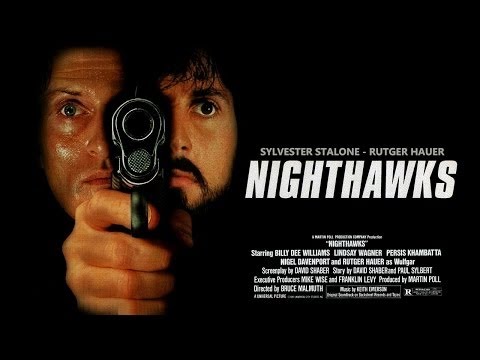Nighthawks (1981).
In the filmography of any actor there are highs and lows and there is no doubt that this applies to the films of Sylvester Stallone. However, there are occasions when some of an actor’s best work is overlooked and 1981’s Nighthawks is certainly one of those occasions.
To many, Sylvester Stallone is often written off as one of the film stars of the ’80s and ’90s who was very much put in the box of “Action Star”. However, for every negative comment made about his acting abilities, I’ve heard people who consider themselves more seasoned film fans coming to his defence.
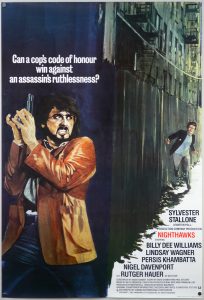 The “defender” will react deftly, often citing his performance in Copland (1997) or reminding people of how the early Rocky films weren’t the franchise-friendly, montage-filled movies that many now write them off as. It’s usually noted by the “defender” that not only was he nominated for a Best Actor Oscar at the 1977 Academy Awards for his in role in Rocky, but that the same film that he himself wrote, actually won Best Picture that year. The “defender” will note how not only has Stallone gone on to have written many of his best roles, but that he has also directed several of them. During the last few years Stallone has been resurgent with his Expendables franchise which I will in no way try to defend but he has also returned to form with his comeback as the Italian Stallion in Ryan Coogler’s Creed (2015) for which he also received an Academy Award nomination for Best Supporting Actor. As you are reading this it’s hopefully becoming obvious that I am playing the role of the “defender”. I could write this whole article defending in fact, but instead I’m here to discuss Nighthawks as I feel it’s a real hidden gem and, if like me, your memory is based on a late night TV viewing years ago, it’s definitely worth seeking it out to re-watch.
The “defender” will react deftly, often citing his performance in Copland (1997) or reminding people of how the early Rocky films weren’t the franchise-friendly, montage-filled movies that many now write them off as. It’s usually noted by the “defender” that not only was he nominated for a Best Actor Oscar at the 1977 Academy Awards for his in role in Rocky, but that the same film that he himself wrote, actually won Best Picture that year. The “defender” will note how not only has Stallone gone on to have written many of his best roles, but that he has also directed several of them. During the last few years Stallone has been resurgent with his Expendables franchise which I will in no way try to defend but he has also returned to form with his comeback as the Italian Stallion in Ryan Coogler’s Creed (2015) for which he also received an Academy Award nomination for Best Supporting Actor. As you are reading this it’s hopefully becoming obvious that I am playing the role of the “defender”. I could write this whole article defending in fact, but instead I’m here to discuss Nighthawks as I feel it’s a real hidden gem and, if like me, your memory is based on a late night TV viewing years ago, it’s definitely worth seeking it out to re-watch.
In most retrospective reviews I feel that it’s sometimes perfectly reasonable to talk in depth about certain scenes without having to alert the reader to the spoiler elements included as a result. Usually you’re talking about a well received film and no doubt assume that the reader has already seen it, maybe even several times but here I will try to keep that to a minimum upon the presumption that you, the reader, will have either not seen Nighthawks or may have a hazy recollection of it at best. There will however, be some very minor spoilers included so be warned.
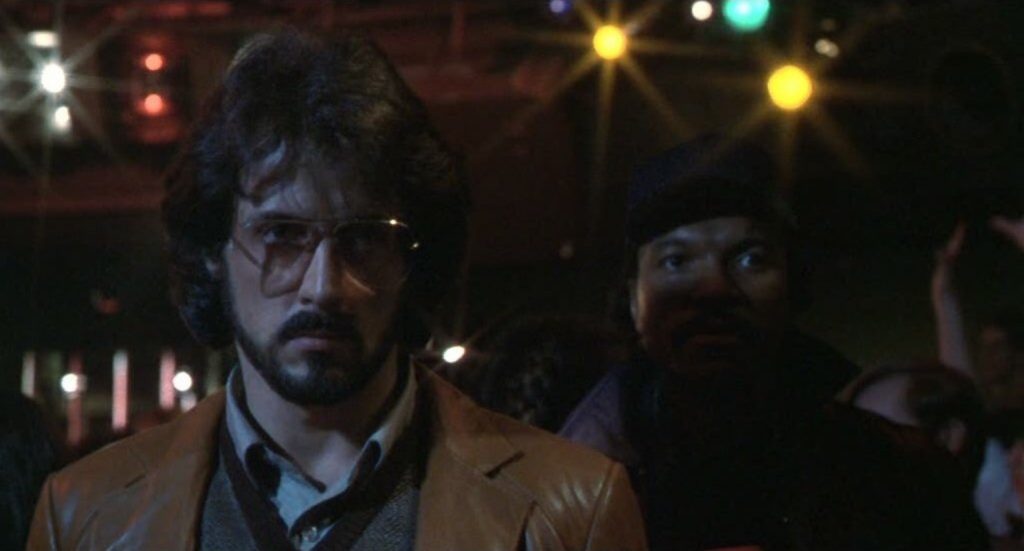
Nighthawks tells the story of two tough New York street cops originally assigned to the covert operations division, Sgt. Deke DaSilva (Stallone) and Sgt. Matthew Fox (Billy Dee Williams). At the start we are introduced to the characters using their well honed policing skills to entrap would-be muggers and busting down drug houses. The pair appear to have worked together for some time and there’s a believable chemistry between them with the usual cop banter between the two. This all seems like pretty run of the mill cop film fodder and is replete with them having a tough and angry Police Captain, ably played by a fellow Rocky alumni, Joe Spinell. We are then introduced to the terrorist bomber Heymer Reimhardt who uses the pseudonym “Wulfgar” when committing acts of terror. We first see what he’s capable of during a scene in London where he’s being pursued by a high ranking member of Interpol’s Anti Terrorist Squad, Peter Hartman (Nigel Davenport). Due to a major mishap, Wulfgar (a great Rutger Hauer) finds himself exposed to the authorities and is thus unable to gain work from his evil employers, so he decides to relocate to New York where he has a plan to orchestrate a new act of terror to once again gain their approval.
As a result of Wulfgar‘s relocation, a new anti terror operation is set up in the Big Apple with the NYPD and Interpol working in conjunction. Both DaSilva and Fox find themselves on temporary assignment to the task force under the supervision of Hartman due to their previous extended military experience and a deadly game of cat and mouse ensues between the authorities and the terrorist. Other than a throwaway line regarding Fox’s army past, we find out little else about the character but we are given a small glimpse into DaSilva’s background with the introduction of his ex-wife Irene, played by Lindsay Wagner. It appears that the couple split up due to Deke’s commitment to his role and his firm work ethic, but throughout the movie DaSilva is seen attempting to win her back and appears to be having some success. DaSilva also has a strong moralistic approach to his new assignment and he initially refuses to take the harder line in situations put forward for the capture and potential killing of Wulfgar by Hartman, stating that although he has many confirmed kills during his military service, that the demands of war and law enforcement are completely different.
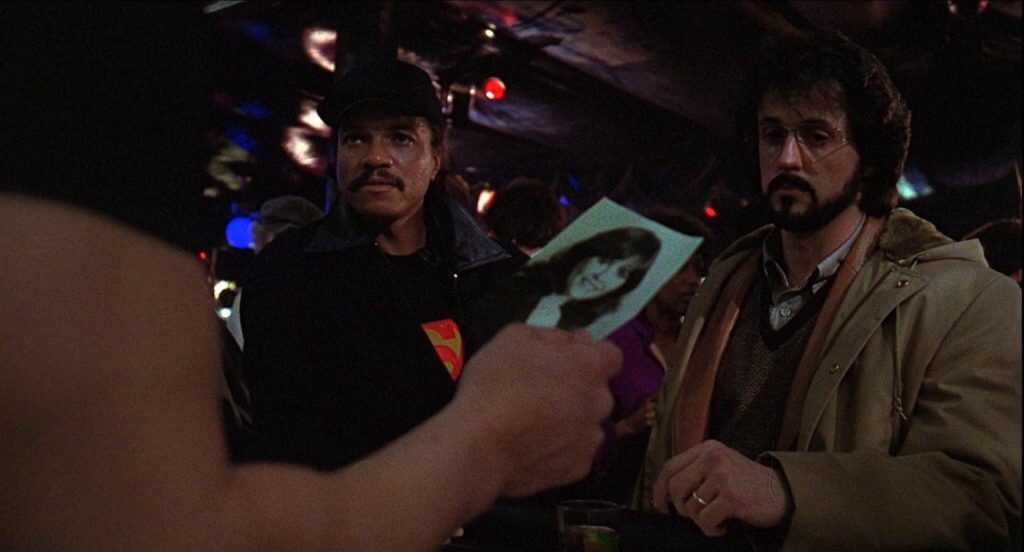
As the investigation into apprehending Wulfgar continues and the terrorist begins his reign of terror within the city, the story becomes more of a personal conflict between him and DaSilva and a deep rivalry is formed. An icy encounter between the two is followed by a foot chase through the city’s underground Metro system resulting in a compelling and dramatic standoff between the two men where the lives of several high profile hostages are at stake.
Being so carefully gauged in its dramatic elements and having such a compelling narrative, Nighthawks doesn’t fall under the traditional banner of “Action Movie” and has a look and feel very much reminiscent of a gritty ’70s cop drama. Stallone plays his role completely straight, devoid of any cheesey one-liners and with his thick beard and large rimmed glasses, he looks more like Frank Serpico than John Rambo.
Rutger Hauer has a history of playing darker characters and with this film marking his American debut, I’d argue that this is one of his best performances. He’s ice cold in both his mannerisms and delivery of dialogue and in the aforementioned initial confrontation with DaSilva, the two simply glare at each other across a crowded nightclub, which effectively provides the viewer with more than enough non-verbal exposition to convey the intense rivalry that will grow between the protagonist and antagonist.

Both Wulfgar and DaSilva go on to play their deadly game throughout the remainder of the film without it once ever dropping pace. Their shared hatred forms the main narrative bulk in the film’s second half. It’s extremely well done, without it ever feeling over-cooked. Billy Dee Williams’ character Fox is somewhat underdeveloped and certainly should have been given more screen time but doing so may well have pulled the viewer away from the main rivalry that is so intrinsically central to Nighthawks’ core narrative.
The film has an interesting backstory and was beset with production problems. As stated, Nighthawks captures the essence of a gritty ’70s cop drama and interestingly, the original story was written as the third French Connection film for 20th Century Fox and would have pitched Gene Hackman’s “Popeye Dolye” up against the terrorist with Richard Pryor said to be in consideration to play his wise cracking sidekick. When Hackman declined the opportunity to reprise the role, the idea was scrapped and Universal picked up the rights with the original writer David Shaber reworking the script into Nighthawks. The production struggled early on with the firing of original director Gary Nelson who had previously directed two Disney films, Freaky Friday (1976) and The Black Hole (1979).
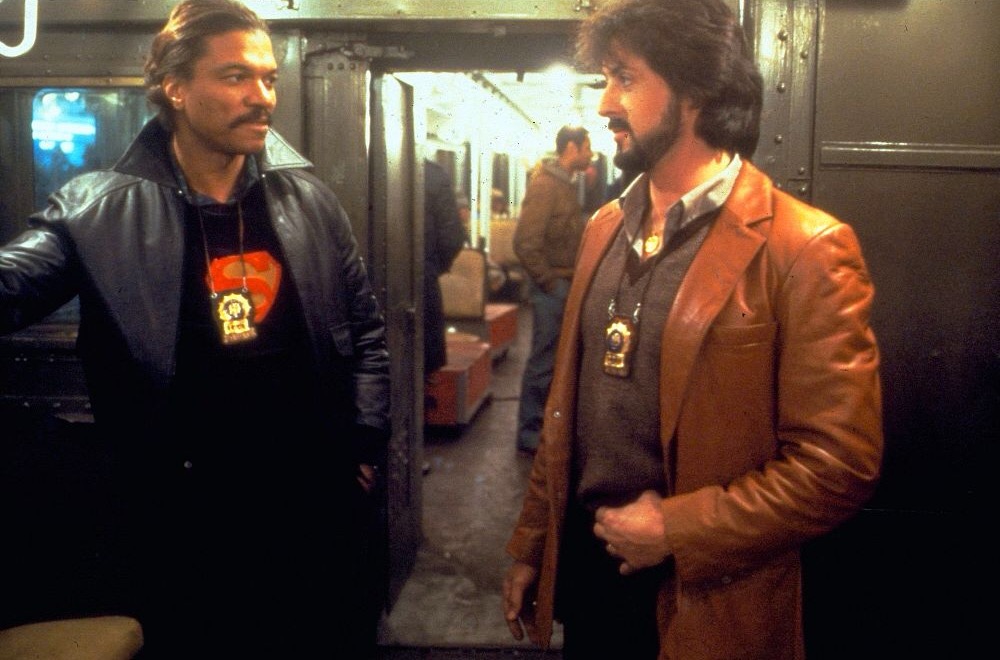
The job of director was then “officially” given to director Bruce Malmuth who had mainly worked in television and had only one minor film credit to his name at the time. On the first day he was due to restart the shoot, he was delayed during his travel to the location and Stallone assumed the role of director to stage and shoot the foot-chase throughout the subway network. Watching this scene now it’s impossible not to make a comparison with the two foot pursuits seen in both William Friedkin’s The French Connection film and John Frankenheimer’s very underrated sequel, French Connection II. It’s rumoured that although Malmuth is credited as director, that Stallone actually deserves the credit and that were it not for the governance of the Director’s Guild of America who states that “anyone who is signed to work on a movie before the director was engaged cannot replace a fired director”, that Stallone would have naturally received the credit. The actor had recently directed Rocky II prior to Nighthawks and this theory seems all but confirmed by his co star Wagner who stated in an interview afterwards that Stallone had “taken the film over and directed it”. She stated that he was “awe inspiring” and it was “quite educational watching him work on so many levels at one time.”
Stallone has referred to the shoot as “the most stressful time of my career”. It’s said that he would isolate himself in his hotel room when he was not on set and both he and Williams spent a considerable amount of time working with undercover cops in preparation for their roles.
Hauer also had a tough time and suffered a double tragedy during filming losing both his mother and a close friend. This required him to leave the production to attend two separate funerals as result. He was also injured during a scene when a squib set up to simulate a gun shot malfunctioned causing a burn to his skin and a wire set-up to send him backwards as the result of a gun shot was pulled with excessive force causing him a minor back strain. Interestingly, this wire pull was said to be upon the instruction of Stallone, again confirming his directorial input, as it does not occur during the foot-chase scene, for which he is credited. This was said to be the first scene in the movie that Hauer filmed and led to rumours of the two actors clashing on set frequently afterwards.
Both Hauer and Stallone have been interviewed in the intervening years and now seem keen to play down any conflict with both acknowledging each other’s respective work on the feature. Nighthawks also suffered from studio interference, concerned that the film was too bloody and violent and was said to be subjected to some heavy editing as a result. This is particularly noticeable in the final scene, with a character’s blood stained top appearing to show more gunshot and blood damage than the actual number of shots fired by the shooter. In spite of this the final film received positive reviews upon its release and recovered its $5 million budget, grossing $14.9 million in the U.S. and a further $5 million overseas.
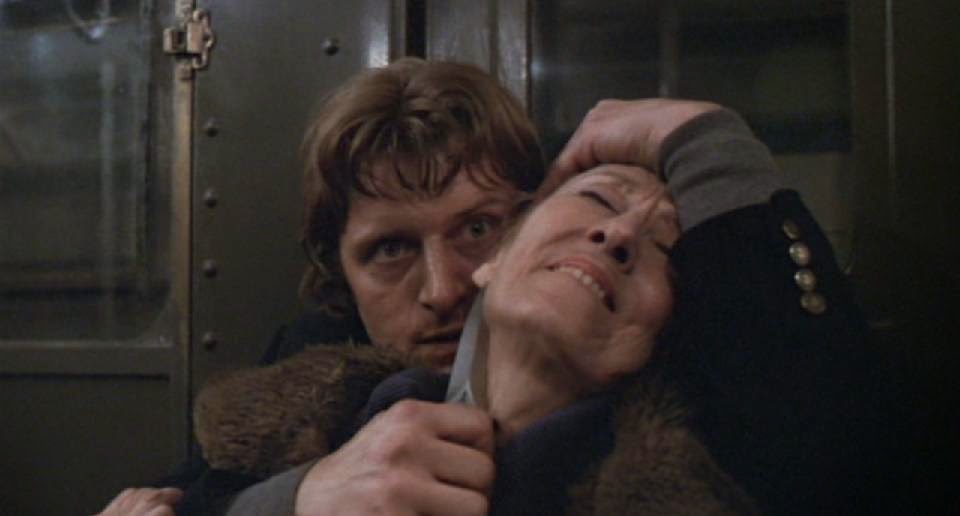
For me Nighthawks encapsulates a time when Stallone was definitely looking upon himself as more of a character actor. Seeking to take on more interesting and layered roles rather than the more generic action characters that he would later become associated with, and it could be argued that a lot of that later association came from an organic, audience based demand. For example, compare First Blood to the following two Rambo films in terms of realism and performance. It would appear that he was simply guilty of giving the audience what it wanted in an era of films dominated by muscle bound heroes carrying machine guns, which got bigger with each successive release. This logic was certainly backed up by the box office takings for such films.
Nighthawks does fall short of the same level of gritty realism of the two French Connection films, but I would definitely recommend that you seek it out, certainly if you are willing to overlook some minor niggles such as the accompanying score by Keith Emerson, which is overly synthesised and may well have been better served by a more traditional orchestral approach. Whilst Nighthawks does succumb to some genre conventions, that genre is more the gritty crime drama as opposed to the action film genre that Stallone is more associated with and is therefore well worth seeking out and a film that should be considered amongst films such as Rocky and Copland as examples of an actor/writer/director who is too often denied the credit he truly deserves.
Film ’89 Verdict – 8/10

